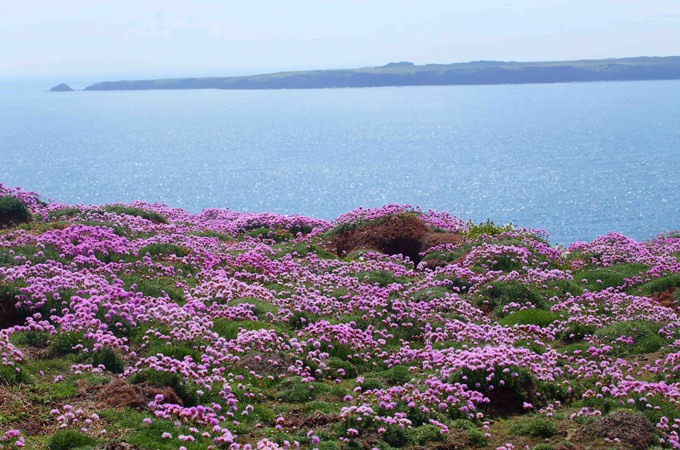The puffins of Wales face a stormy future
Climate change is thought to be churning rougher seas, causing mass seabird deaths earlier this year.

Skomer Island, United Kingdom – This small island off the coast of Wales, a haven for seabirds like puffins, razorbills and guillemots, is setting the example for responsible tourism.
No more than 250 tourists are allowed to visit Skomer Island on any given day. The land is managed by the Wildlife Trust of South and West Wales and two wardens managing the reserve strictly regulate human activity.
Keep reading
list of 4 itemsTurtles swimming to extinction in Malaysia as male hatchlings feel heat
Could shipping containers be the answer to Ghana’s housing crisis?
Thousands protest against over-tourism in Spain’s Canary Islands
But mass bird deaths earlier this year have led researchers to worry about the effects of climate change here, a 20-minute boat ride from mainland Wales.
Skomer has much to offer nature aficionados and bird-watchers, who enjoy close encounters with puffins amid a haze of bluebells and orchids. In April, hundreds of puffins – presenting a clown-like appearance with their poker faces and orange beaks – arrive here to breed.
And black and white razorbills – medium-sized seabirds with thick, black beaks – stand guard on the island’s periphery, like sentries announcing the arrival of visitors to their land. The bird has a thick black beak which is deep and blunt, unlike the thin bill of another species found here – the guillemot, also found in large numbers on Skomer.
 |
| Skomer Island is covered in wild flowers [Vijay Bedi/Al Jazeera] |
“The entire island is like a huge chunk of Swiss cheese perforated with holes, playing host to colonies of ground-nesting birds,” explains Birgitta Bueche, one of the wardens. A stern warning is issued to all tourists to walk only on the clearly designated walking trails. Otherwise, “you could be stepping right on the nest of a puffin”, she warns.
Tourists are free to walk the entire length of the island, which offers a panoramic view of the Welsh summer in its full glory. The entire island is carpeted with wild flowers, and a shimmer of bluebells as far as the eye can see makes this island a photographer’s delight.
In addition to its puffin population, Skomer is also the most important breeding site in the world for Manx shearwaters. Other birds present in large numbers include kittiwakes and great black-backed gulls. In summer, grey seals and harbour porpoises can also be seen around the blue waters of Skomer.
Like catching fish inside a washing machine
But all is not well in this haven for birds. Unbeknown to the tourists arriving here in summer, the birds of Skomer have had a rough winter out at sea. In February, thousands of seabirds – mainly Atlantic puffins, but also guillemots and razorbills – were found dead on France’s Atlantic coast, the Channel Islands, and Wales.
Scientists believe that repeated storm surges on the west coasts of Britain and France may have been responsible for the mass deaths, by making it difficult for the seabirds to forage in the rough seas. The Royal Society for Protection of Birds commented that for the puffins, feeding in storm-tossed seas must be akin to catching fish inside a spinning washing machine. That’s why most of the birds found were underweight and appeared to have starved to death.
Dr Tim Birkhead, a scientist at the University of Sheffield, has been monitoring the bird populations of Skomer for the past 40 years. He suspects that climate change is playing a role.
We really need to understand how our birds are reacting to these threats if we are to be equipped to help them.
“Among other things, we have shown a strong effect of climate change on the timing of breeding,” said Birkhead, “with breeding becoming progressively earlier between 1970s and 2010”. The storms in February resulted in high mortality among guillemots. “We recorded a threefold increase in the deaths of our ringed birds on Skomer. Stormy weather makes it difficult for guillemots to feed, and persistent storms resulted in many birds starving to death.”
The Wildlife Trust, the charity that manages nature reserves like Skomer, reported at the time that “more than 2,300 birds have been reported washed up on UK and Channel Island shores, reaching far and wide, but to date the majority are being found in Wales, the South West and the Channel Islands”.
How birds react to threats
Birkhead says that’s not the only trouble.
Natural Resources Wales (NRW), a body sponsored by the government that manages the region’s environment, has withdrawn funding from long-term seabird research such as Birkhead’s 40-year-old programme monitoring Skomer’s guillemots. Birkhead is concerned that the system NRW plans on using “is more superficial, more prone to observer error, and in general, greatly inferior to the one we have been using”.
Dr Lizzie Wilberforce, the conservation manager of the Wildlife Trust of South and West Wales, shares his concerns. “We really need to understand how our birds are reacting to these threats if we are to be equipped to help them, especially with record-breaking storms causing massive mortality of birds wintering at sea,” she said. The storm surges and the diminishing funds have proved to be a double whammy for the birds. In response, Birkhead has launched a petition hoping to generate more awareness.
Even as the rain pelts down, hordes of birdwatchers, tourists, and nature-obsessed photographers leave Skomer smiling. Once the afternoon boat pulls away, snap-happy tourists take one last shot of the clowns of the sea – bobbing in the waters, swooping down from the cliffs, their bright orange beaks shining like beacons against an overcast sky.
With funds for research dwindling and the effects of climate change looming large, researchers hope this coming winter will be gentle on the puffins and their feathered companions on Skomer Island.